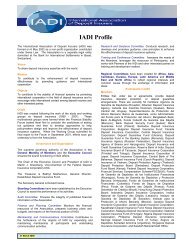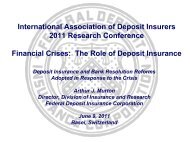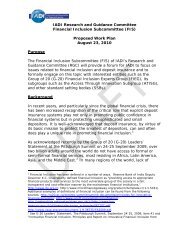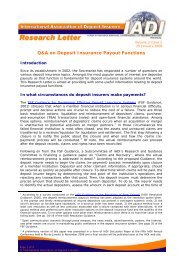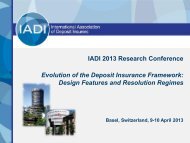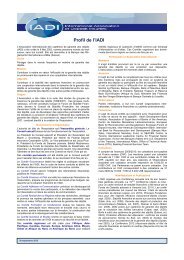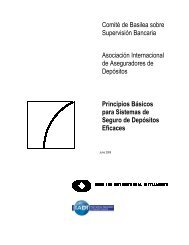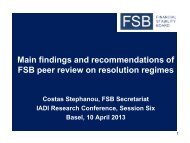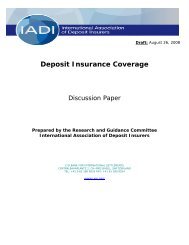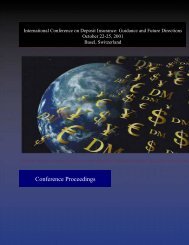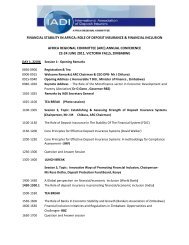Volume II - PDF - International Association of Deposit Insurers
Volume II - PDF - International Association of Deposit Insurers
Volume II - PDF - International Association of Deposit Insurers
- No tags were found...
You also want an ePaper? Increase the reach of your titles
YUMPU automatically turns print PDFs into web optimized ePapers that Google loves.
•BACKGROUND DOCUMENTS•<br />
Part <strong>II</strong>: Outreach<br />
under blanket coverage in the face <strong>of</strong> admitted<br />
excess capacity. Second, he raised the possibility <strong>of</strong><br />
limiting small depositors’ coverage across the<br />
banking system instead <strong>of</strong> setting the limit bankby-failed-bank<br />
as is commonly done.<br />
In response, Mr. Isoard observed that it would<br />
not be possible to close all banks when all were<br />
insolvent, so that a blanket guarantee was the best<br />
option. Mr. Tatom responded that insolvent banks<br />
need not be closed. Necessary and sound banking<br />
functions could be continued under new owners.<br />
Mr. Hanc noted that setting a system-wide coverage<br />
limit would make it difficult to estimate entitlements<br />
when a bank failed and slow the payout<br />
process. Such a change had been proposed in the<br />
United States and rejected under the first Bush<br />
Administration. Mr. Eisenbeis downplayed the<br />
importance <strong>of</strong> the size <strong>of</strong> the deposit insurance<br />
fund and claimed that government backing and<br />
ex post settling up by surviving banks would be<br />
sufficient where the government was financially<br />
credible. Pr<strong>of</strong>essor Kaufman noted that funding for<br />
deposit insurance had become entirely private in<br />
the United States following the FDIC Improvement<br />
Act. Pr<strong>of</strong>essor Pennacchi disagreed. He expressed<br />
his belief that the US government would provide<br />
financial aid in a situation where deposit insurance<br />
premiums rose so high as to threaten surviving<br />
banks.<br />
Pr<strong>of</strong>essor Jackie So <strong>of</strong> Southern Illinois University<br />
pointed to the difficulty <strong>of</strong> continually monitoring<br />
a bank’s condition to identify and avoid sudden<br />
portfolio changes that could render it insolvent.<br />
Mr. Eisenbeis considered that the problem was<br />
broader, especially when it came to the desirability<br />
<strong>of</strong> marking the portfolio to market. Nevertheless,<br />
Mr. Eisenbeis was confident that markets could<br />
identify weak banks, such as LTCM in 1998, and<br />
that regulators now had the power to resolve them<br />
when their capital fell to two percent <strong>of</strong> assets.<br />
Panel <strong>II</strong>I: Where Do We Go<br />
From Here<br />
Pr<strong>of</strong>essor Kaufman moderated this panel, calling<br />
first on Mr. Hanc to explain what the Working Group<br />
had heard and then on Mr. Evan<strong>of</strong>f to summarize<br />
what the academics had been saying.<br />
Mr. Hanc wondered whether the day had revealed<br />
a large measure <strong>of</strong> agreement on potentially contentious<br />
issues despite the frustration expressed by<br />
some over the approach that the WGDI was using.<br />
Nevertheless, he had heard much good advice—do<br />
no harm and possibly do some good, be bold, and<br />
design a system—not just a set <strong>of</strong> spare parts.<br />
Unfortunately, he noted, the advice given was not<br />
always consistent. He observed that the discussants<br />
suggested that (1) market discipline should be<br />
given greater attention, (2) bank failures were not<br />
all bad, and (3) analysts must distinguish between<br />
runs on good banks and runs on bad banks.<br />
Mr. Evan<strong>of</strong>f observed that deposit insurance is an<br />
important, but not an easy topic, partly because<br />
it involved so many trade<strong>of</strong>fs. He praised the<br />
WGDI for being willing to take on a difficult task.<br />
Concerning trade<strong>of</strong>fs, for example, he observed<br />
that, while policymakers desired stability, it must<br />
be not achieved at the expense <strong>of</strong> stagnation: innovation<br />
must not be stifled. He recommended that<br />
the Working Group: (1) ground its recommendations<br />
more firmly in theoretical and empirical<br />
research; (2) find commonalities across countries<br />
on such things as infrastructure requirements,<br />
corporate governance, coverage limitations, closure<br />
policies, and ways to price risk; and (3) recall “the<br />
Lucas critique,” which notes that behavior may<br />
change in unexpected ways when policy changes.<br />
He noted that the issues were sufficiently important<br />
that help would be available to the group<br />
in implementing these recommendations if it<br />
requested such help.<br />
171<br />
Guidance for Developing Effective <strong>Deposit</strong> Insurance Systems: <strong>Volume</strong> <strong>II</strong>



